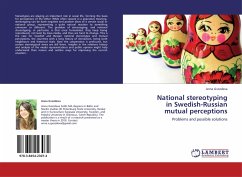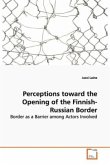Stereotypes are playing an important role in social life, forming the basis for perceptions of the Other. While often viewed in a pejorative meaning, stereotyping can be both negative and positive ideas of a certain social or national group, representing a quite natural reaction to something unknown or different. The problem of stereotyping, and national stereotyping, in particular, is that once formulated, they keep being reproduced, not least by mass media, and thus are hard to change. This is the case for Swedish and Russian national stereotypes and mutual perceptions, the countries with a long history of interaction, being both neighbours and historical rivals. Now the cooperation is profound, but certain stereotypical views are still there. Insights in the relations history and analysis of the media representations and public opinion might help understand their nature and outline ways for improving the current situation.
Bitte wählen Sie Ihr Anliegen aus.
Rechnungen
Retourenschein anfordern
Bestellstatus
Storno








